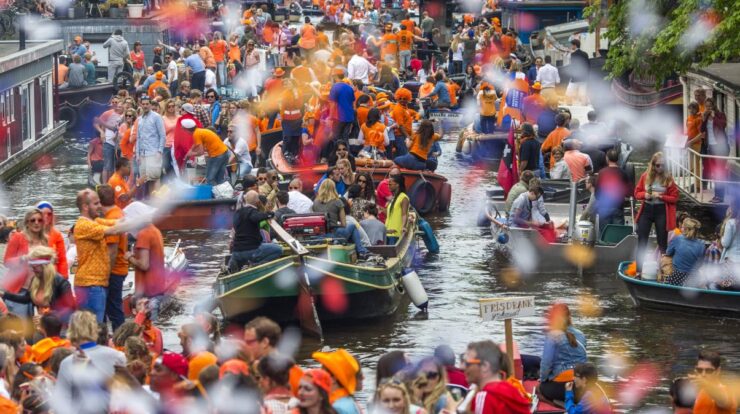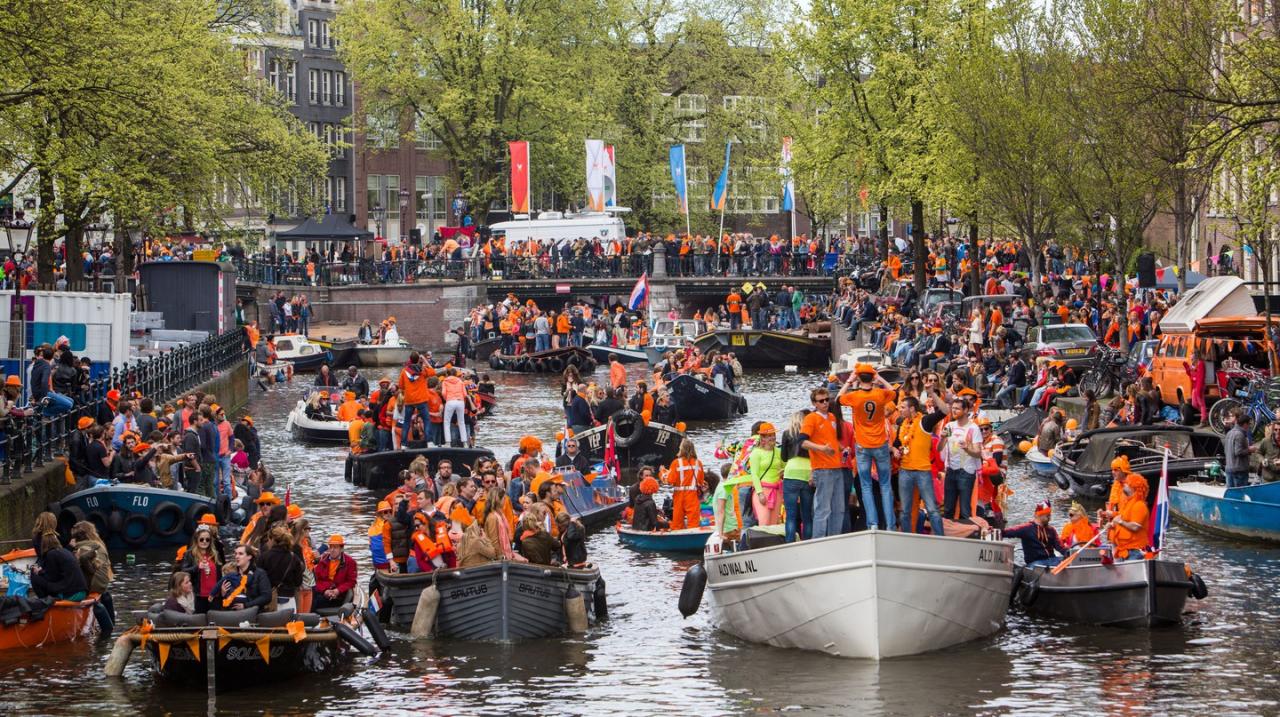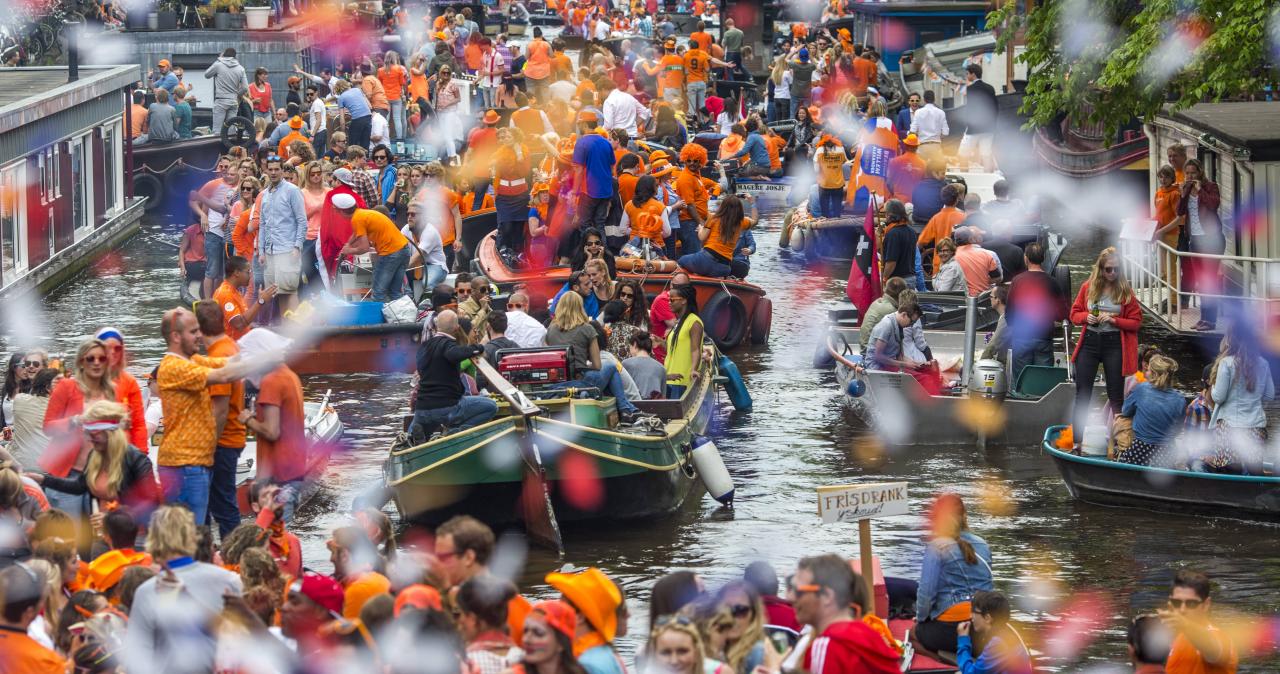
As King’s Day Netherlands takes center stage, this opening passage beckons readers into a world crafted with journalistic flair and a news-oriented tone, ensuring a reading experience that is both absorbing and distinctly original.
King’s Day Netherlands, a vibrant celebration deeply rooted in Dutch history and tradition, unfolds as a captivating spectacle of festivities, pageantry, and national pride.
Historical Origins of King’s Day: King’s Day Netherlands
King’s Day in the Netherlands, formerly known as Queen’s Day, is a national holiday celebrated on April 27th to commemorate the birthday of the reigning monarch. The origins of this celebration can be traced back to the 19th century.
The Dutch monarchy has a long and illustrious history, dating back to the Middle Ages. The current monarch, King Willem-Alexander, is the head of the House of Orange-Nassau, which has ruled the Netherlands since 1815. The monarchy plays a symbolic role in Dutch society, representing the unity and stability of the nation.
King’s Day was first established in 1885 as Princess’s Day to celebrate the birth of Princess Wilhelmina, who later became Queen Wilhelmina. After her abdication in 1948, the holiday was renamed Queen’s Day in honor of her daughter, Queen Juliana.
In 2013, when King Willem-Alexander ascended to the throne, the holiday was renamed King’s Day.
Festivities and Traditions
King’s Day is a vibrant and festive occasion marked by a variety of traditions and activities.
- Orange:The official color of King’s Day is orange, which is associated with the Dutch royal family. On this day, people dress in orange clothing, decorate their homes and streets with orange flags and streamers, and eat orange-colored food and drinks.
- Vrijmarkts (Free Markets):One of the most popular traditions of King’s Day is the vrijmarkts, or free markets. These markets are held throughout the country, where people can sell and buy second-hand goods, antiques, and homemade crafts.
- Koningsdag Concert:The Koningsdag Concert is an annual open-air concert held in Amsterdam on the eve of King’s Day. The concert features performances by Dutch and international artists and is attended by thousands of people.
Impact on Dutch Society

King’s Day has a significant social and cultural impact on Dutch society.
- Sense of Unity:King’s Day is a time for the Dutch people to come together and celebrate their national identity. The festivities foster a sense of community and belonging among the people.
- Preservation of Heritage:King’s Day also plays a role in preserving Dutch heritage and traditions. The vrijmarkts, for example, have been a part of Dutch culture for centuries and offer a glimpse into the country’s past.
International Recognition and Tourism
King’s Day has gained international recognition and attracts tourists from around the world.
- Amsterdam:Amsterdam is the epicenter of King’s Day celebrations, with hundreds of thousands of visitors flocking to the city for the festivities. The city’s canals are filled with boats decorated in orange, and the streets are lined with vendors and performers.
- Economic Impact:King’s Day is a major economic driver for the Netherlands, particularly in Amsterdam. The influx of tourists generates significant revenue for the hospitality, retail, and transportation sectors.
Evolution and Modern Adaptations

King’s Day has evolved over the years, reflecting changes in Dutch society and culture.
- Technological Advancements:Technology has played a significant role in shaping King’s Day celebrations. Social media, for example, has become a platform for people to share their experiences and connect with others during the festivities.
- Sustainability:In recent years, there has been a growing emphasis on sustainability during King’s Day celebrations. Initiatives have been implemented to reduce waste and promote eco-friendly practices.
Environmental Sustainability
King’s Day celebrations can have an environmental impact, but efforts are being made to reduce this impact.
- Waste Reduction:Initiatives have been introduced to encourage waste reduction during King’s Day. These include the use of reusable cups and plates, as well as designated recycling bins.
- Sustainable Transportation:The Dutch government and local authorities promote sustainable transportation during King’s Day. Public transportation is encouraged, and many cities offer free or discounted transportation options.
Cultural Significance and Symbolism
King’s Day is a cultural symbol that reflects the values and identity of the Dutch people.
- National Pride:King’s Day is a time for the Dutch people to express their national pride and unity. The festivities celebrate the country’s history, culture, and traditions.
- Symbol of the Monarchy:King’s Day is a symbol of the Dutch monarchy, which represents the stability and continuity of the nation. The celebration reinforces the role of the monarchy in Dutch society.
Wrap-Up
In the tapestry of Dutch culture, King’s Day Netherlands stands as a vibrant thread, weaving together the past, present, and future of this proud nation. As the echoes of celebration fade, the spirit of unity and shared heritage lingers, reminding the Dutch people of the indomitable spirit that binds them together.
Popular Questions
What is the significance of orange during King’s Day celebrations?
Orange is the official color of the Dutch royal family, the House of Orange-Nassau, and has become synonymous with King’s Day festivities.
What are vrijmarkts and what role do they play in King’s Day?
Vrijmarkts, or free markets, are a popular tradition during King’s Day where people set up stalls to sell second-hand goods, homemade crafts, and food.
How has King’s Day evolved over the years?
King’s Day has undergone several changes over the years, with the most notable being the shift from a somber day of remembrance to a festive celebration.